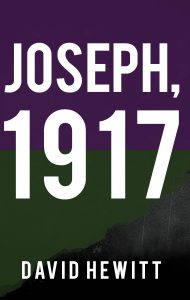Contributed by David Hewitt
 Joseph fought in the First World War, even though that certainly wasn’t what he wanted.
Joseph fought in the First World War, even though that certainly wasn’t what he wanted.
Oddly, he had at one time volunteered for military service. But, even more oddly, he had subsequently been made exempt. A committee of councillors decided that he was a market gardener and his work was essential to the war effort.
I chose Joseph’s case from a large number I had found at the Lancashire Archive in Preston. Those cases concerned men from all over the county, but the great white windmill he could see from his house can be seen from my house too.
This was the second time I had looked in the Preston archive. The first time had been more than a decade before, when I was studying for a postgraduate degree, but my subject then – the way libel and slander were dealt with in medieval church courts – couldn’t really be more different.
There was something about the cases that also echoed my work. I sit as a tribunal judge and, although I don’t get to decide whether someone should be sent to war, I know what it’s like to have to deal with pressing social issues and to do so without much time and with only the barest of evidence.
It was in the Preston archive that I learned about Joseph’s exemption, but I also learned there that the exemption was subsequently taken away.
To find out why that was, I had to look at records kept in the National Archive in Kew, and to the decisions of the Central Tribunal, which had the final say in matters of this kind. Many of the tribunal’s records are available online, and they include the records about Joseph.
The Central Tribunal sat for much of the war and even beyond. Based in Westminster, it was at the time led by the fourth Marquess of Salisbury. In Joseph’s case, it decided that he was not a market gardener at all, but merely a hawker of fruit and vegetables. That decision was made in May 1917, and within weeks, Joseph was pulling on a khaki tunic.
From that point on, the story unfolds in various vivid newspaper reports, which I found in my local library and which tell a truly remarkable story.
The decision of the Central Tribunal so angered the councillors who had given Joseph his exemption that they went on strike, and throughout the summer of 1917, they refused to hear even a single military case. They said they wanted Joseph to be sent back from the Army, but although a massive backlog built up, they never got their wish.
In the dog days of August, the councillors were visited by a mysterious government inspector. He came from Liverpool and had odd culinary tastes, and the old house that served as his office would, fifty years later, provide a home for John Lennon and his new wife.
What the inspector told the councillors has now been lost, but it was sufficient to send them back to their judicial work. Joseph, meanwhile, had begun his inexorable journey towards the hell of the Western Front, and the Kew records have one last, maddening secret to reveal.
The councillors were angry because they suspected that the Central Tribunal had been influenced by fresh evidence Joseph himself was not permitted to see. They might have been told that by the inspector and from what I have seen, I think they were right.
Although there is no trace of any fresh evidence, the records do contain a brief memorandum, plainly intended to guide Lord Salisbury and his colleagues in their future deliberations.
The memorandum says that where any information is received that might be decisive, it should always be shown to the man concerned. I was able to study all of the cases the Central Tribunal considered and I am satisfied that there is none but Joseph’s to explain why the document was produced.
What angers me most, though, is not that Joseph was put in harm’s way because of secret evidence, but that even though the tribunal knew it had made a mistake, it did nothing to put that mistake right.
I hope that, sitting in the comfort of my own book-lined hearing-room, I would have acted very differently.
 A few months later, with the British Army sweeping decisively through northern France, Joseph was killed in action, as he scrambled across farmland close to the river Somme. His name can be seen on a tablet in the military cemetery at Vis-en-Artois. That tablet is one of many there, which commemorate several thousand fallen soldiers who have no known grave.
A few months later, with the British Army sweeping decisively through northern France, Joseph was killed in action, as he scrambled across farmland close to the river Somme. His name can be seen on a tablet in the military cemetery at Vis-en-Artois. That tablet is one of many there, which commemorate several thousand fallen soldiers who have no known grave.
David Hewitt is a lawyer and a writer. His book about this case – Joseph, 1917 – is published by Matador and costs £8.99. www.troubador.co.uk/matador




